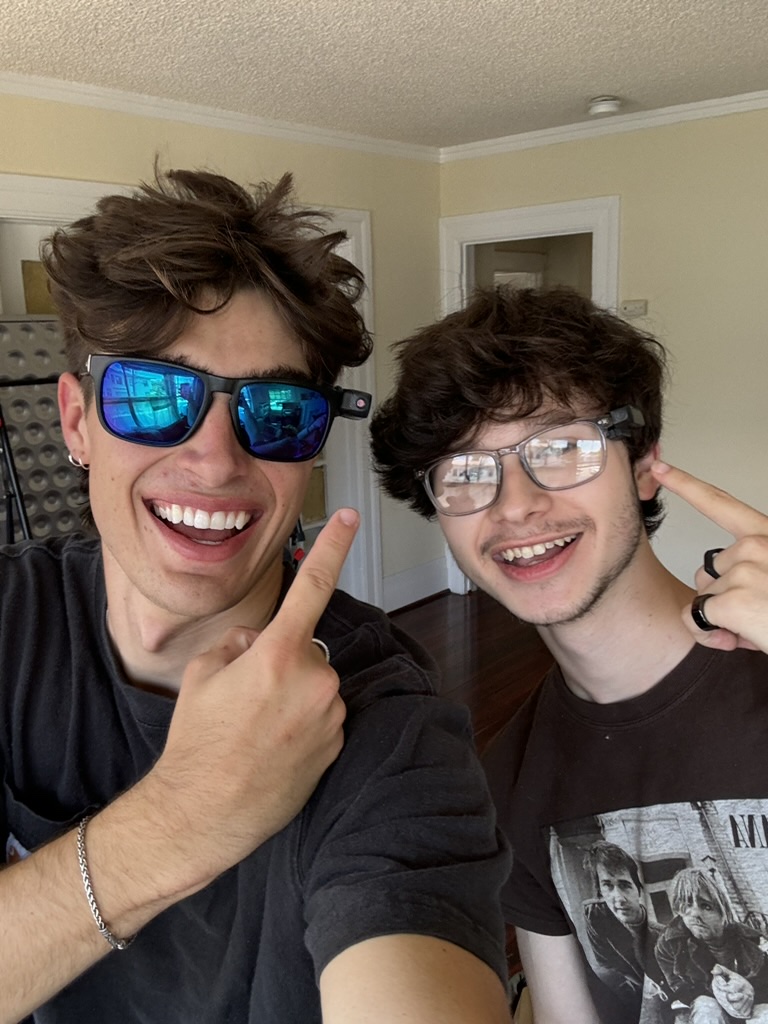Artificial Intelligence
Sidekick by SIER: The two Henrys behind the future of AI glasses
Born in a USC dorm room, Henry Fox and Henry Warren are redefining smart glasses with a mission: tech that begins with accessibility and inclusivity.

Roy Payan lost his vision serving overseas. Since then, he’s fought as a disability rights advocate for a more inclusive world. Now, he says, the breakthrough he’s been waiting for is finally here. “These glasses are exactly what I’ve been waiting for – I’ve been waiting years for this to come.”
The device he’s talking about is Sidekick, a magnetic clip-on that turns any pair of glasses into AI-powered smart glasses for blind and low-vision users. The trick with Sidekick, however, is that anyone can use them. Behind the device are Henry Fox and Henry Warren, who started the project in their USC dorm room four years ago as freshmen and are now launching it to the world through their startup, SIER – Seeing Is Everyone’s Right.
The device is deceptively simple: a sleek clip with a camera, microphone, and speaker. Once attached, it reads menus aloud, offers real-time scene descriptions, integrates with Google Maps for navigation, and even connects users to live agents when AI isn’t enough. But what makes Sidekick stand out isn’t just functionality – it’s the design philosophy. “Too many accessibility devices cost thousands of dollars and make people stand out in ways they don’t want to,” says Fox, founder of SIER. “That means a lot of people never get access at all. We wanted to build something affordable, elegant, and adaptable to any style – something people actually feel good wearing.”
That spirit of inclusivity has driven Sidekick’s design since its first prototype. In their earliest stages, a mentor sent Fox and Warren to test with thirty blind users across ages and backgrounds. “That experience forced us to completely reimagine our prototype,” Fox recalls. “It taught us that real innovation starts with listening, not assumptions.” The feedback didn’t stop with disability. Both Henrys also involved LGBTQ+ users early, ensuring the device didn’t just serve function but reflected identity and confidence. “Inclusivity isn’t just a value we talk about – it’s something we built into the design process,” Warren says.
Sidekick is not just another piece of assistive tech. It is the first modular smart glasses system that adapts to any pair of frames – ranging from subtle reading glasses to bold sunglasses, or even sequined, Elton John–style statement pieces. Fox puts it simply: “Self-expression has always been at the center of our design. People shouldn’t have to trade style for accessibility. Tech should adapt to people, not the other way around.”
This design philosophy resonates with the LGBTQ+ community, where self-expression through fashion has long doubled as identity and resistance. Sidekick taps into that tradition – turning what might have been another clinical assistive device into something closer to an accessory of pride. The team jokes that it works as well at a rave as it does in a restaurant, because that’s the point: accessibility should blend into daily life.
On the technical side, Warren emphasizes that inclusive design is what makes the product better. “One of the clearest lessons was that more information isn’t always better. People wanted clarity, not clutter. Another big one was style – nobody wanted to be locked into a few frame options. That’s why we made it a clip-on.” He describes Sidekick as “an open source platform for visual AI agents that can scale across accessibility, education, industrial training, and consumer markets.” Their approach is already paying off. What began with $100,000 in USC competition winnings has grown into a venture backed by early investors and preparing to scale. Institutions serving blind and low-vision users are first in line, but Sidekick is also drawing interest from the broader consumer market. Following the launch of online pre-orders, thousands have signed up for the waitlist to claim their own. Fox puts it, “Accessibility isn’t a constraint, it’s a design advantage. By building inclusively from the start, we ended up with a smarter, more versatile product than if we had aimed for a generic ‘average’ user.”
Now, Fox and Warren say, they’re ready for the next step: outside investment. “We’ve proven the tech works and that people want it,” Fox says. “What we need now is partners who believe in both the mission and the market.”
For Roy, Sidekick means independence after years of waiting. For the Henrys, it’s proof that designing through disability and queerness can open the future of tech. And for investors, it’s a chance to back a product that shows inclusivity isn’t just good ethics – it’s good business.

-

 Theater5 days ago
Theater5 days ago‘Incitation to the Dance’ asks what happens to love when a younger man cuts in
-

 New York5 days ago
New York5 days agoPride flag removed from Stonewall Monument as Trump targets LGBTQ landmarks
-

 Philippines4 days ago
Philippines4 days agoPhilippines Supreme Court rules same-sex couples can co-own property
-

 Los Angeles4 days ago
Los Angeles4 days agoStonewall Young Democrats bounces back from “quiet year” with Hero Awards
-

 Florida5 days ago
Florida5 days agoDisney’s Gay Days ‘has not been canceled’ despite political challenges
-

 a&e features1 day ago
a&e features1 day agoFrom ‘So Random’ to sexy theater: LA’s very own Mathew Scott Montgomery
-

 Los Angeles2 days ago
Los Angeles2 days agoA new “queer summer camp” cycling event rises from the legacy of AIDS/LifeCycle
-

 Transgender2 days ago
Transgender2 days agoTrans-led organization FLUX celebrates a decade of “transformative” service to TGI communities
-

 Commentary2 days ago
Commentary2 days agoWhat Grindr’s pricey new subscription says about the gays, intimacy, and capitalism in the age of AI